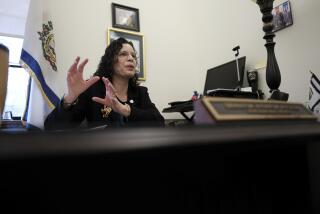Counties, Cities Battle Over State’s Trial Court Funding
Legislation passed in the frantic minutes before the Legislature adjourned last year has now come back to haunt the lawmakers and touched off a ferocious battle between counties and cities over state financial aid.
The dispute is jeopardizing passage of the state’s plan for financing trial courts and could derail efforts under way to restore budget dollars for education, health and other programs.
Last year, the Legislature passed a trial court funding bill committing the state to take over the costs of running trial courts. But in an unusual 3 a.m. vote, exhausted legislators did not appropriate any money for the plan and committed a major error that cities and counties say could cost them millions of dollars in lost revenues.
The error that’s now causing problems had nothing to do directly with trial court funding but related to a special amendment added to give a small group of cities a financial windfall.
The debate over the money and the state’s proposed takeover of the county trial court system has been embittered by complaints of failed promises, underhanded tactics and flat-out illegality in the way the legislation was handled.
Already, Ventura County is seeking a court injunction to void the bill enacted last year, claiming that the Legislature acted illegally. Sen. Quentin Kopp (I-San Francisco) has joined the court action. Kopp calls passage of the disputed bill “a fascinating example of the legislative process at its worst.”
Legislative leaders came to agreement on the bill last Sept. 11, amending it into a measure dealing with criminal penalties for second-degree murder. Despite being written in a way that the Legislature’s own lawyer said was probably illegal, the measure was passed 75 to 1 in the Assembly.
Then, after the Senate Rules Committee voted 3 to 2 to overrule their legal adviser, the measure was taken up in the Senate after midnight. It did not pass until after 3 a.m., and then only after two senators who had gone home to bed were called back to the Capitol to cast the deciding votes in a 28 to 10 roll call. The measure needed 27 votes to pass.
Lawmakers now are trying to put together legislation that would correct the errors of last year’s hastily written bill. Because it is part of a $322-million budget package sought by Republican Gov. George Deukmejian, little progress is expected to be made by the Democratic-controlled Legislature on other budget issues until the trial court funding question is resolved.
Last year’s bill was designed to address what many view as a major flaw in the state’s legal system--requiring individual counties to finance trial courts. Critics say the piecemeal approach has created an uneven judicial system that varies in quality with the wealth of individual counties.
The legislation would create a uniform funding mechanism for the legal system by turning over financing responsibility to the state. It would also expand the judiciary, creating 109 new judgeships.
The proposal is strongly supported by California’s financially strapped counties because it would relieve them of about $350 million in annual trial court costs. The counties have mounted a high-powered campaign to win legislators over to their side.
More than 100 county supervisors and officials came to the Capitol on Wednesday for what they called an “August assault” on the Legislature. Carrying signs reading “Counties are going broke!” and “No more state mandates without money!” members of the supervisors association rallied on the steps of the Capitol.
“Counties want the money we were promised last year for trial court funding and we want it now,” said Barbara Shipnuck, president of the County Supervisors Assn. of California. “We want the game-playing to stop.”
The most controversial feature of last year’s bill was a last-minute amendment requiring counties to give a portion of their savings to a group of small cities that currently receive little or no property tax dollars.
Veteran Lobbyist’s Work
The amendment was sponsored by veteran lobbyist and former Assemblyman Joe Gonsalves, who works for 22 of the cities, and Republican legislators, who represent many of the cities. The GOP legislators withheld support for the trial court funding bill until supporters of the court package agreed to the amendment.
But the legislation was so crudely drafted that when the dust settled months later both the counties and cities were unhappy.
The small cities, which believed they were in line to receive about $196 million in payments from the counties after 10 years, instead found they would receive just $44 million because of the way the bill was drafted. Gonsalves and the Republicans now say they want the law changed to assure the cities of the full $196 million.
Mounting Costs
But counties, faced with mounting costs associated with financing hospital, welfare, libraries and law enforcement, say they were “coerced” into agreeing to the bill in the first place and strongly oppose giving the cities any more money.
Underscoring the bitter debate is the fact that many of the cities in line to receive the extra aid are among the soundest financial municipalities in the state, communities that have used inventive devices such as special districts and contracting out for services.
Some of these cities in the Los Angeles area include La Canada Flintridge, Industry, El Segundo, Cerritos, Thousand Oaks and Camarillo.
After voters approved Proposition 13 in 1978, which slashed property taxes, the Legislature passed a law apportioning the remaining property tax revenues on a formula tied to the level of taxes the cities had been receiving. The cities that were to benefit by the amendment to the trial court funding legislation were municipalities that either did not assess property taxes or did so at very low levels.
Limit Established
Gonsalves said the so-called “no and low” property-tax cities want 10 cents of each property tax dollar generated within their communities. Under the bill passed last year, they would receive 10 cents phased in over 10 years, in increments of one cent a year. The problem is that in drafting the bill, the 10 cents was pegged to revenues generated in the 1987-88 fiscal year instead of those expected for the 1997-98 fiscal year. As a result, payments after 10 years would total $44 million instead of the $196 million the cities thought they would get.
Counties, meanwhile, have regrouped and want the cities cut out of the bill altogether. County officials say they simply cannot afford to give cities any of their revenue, although even with the split in revenues all but seven of the state’s 58 counties would be better off financially at the end of 10 years than they would be if the current system was left in place.
Problem for Ventura County
Of the seven counties that would lose money, Ventura County would fare the worst. One computer analysis shows that in 10 years, the state would assume $20.7 million in trial court costs. But, in return, Ventura County would have to give the state the $15 million in court-related fines and penalties that it now uses to defray the cost of the courts. And cities would receive $24 million in property taxes the county now collects, leaving it with a deficit of $18.4 million.
Orange County would face a deficit of $4 million. Los Angeles County would still be ahead after 10 years, but statistics show that eventually it also would be in a deficit situation.
But although counties would like the cities out of the picture altogether, that is not likely to happen.
“They got their foot in the door last year and there is no way they can be cut out at this point,” one legislative staffer said.
Larry Naake, lobbyist for the County Supervisors Assn. of California, said: “What are cities doing in a trial-court funding bill? They never should have been part of it in the first place.”
Legislative leaders, facing an Aug. 31 deadline for adjournment of this year’s session, have created a two-house conference committee to negotiate a new bill. But so far no compromise has materialized.
Times staff writer Noel K. Wilson contributed to this story.
More to Read
Get the L.A. Times Politics newsletter
Deeply reported insights into legislation, politics and policy from Sacramento, Washington and beyond. In your inbox three times per week.
You may occasionally receive promotional content from the Los Angeles Times.






